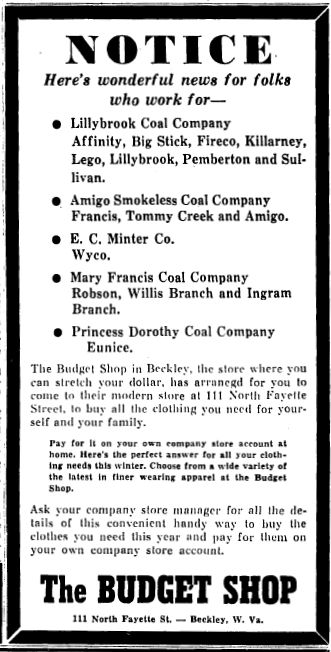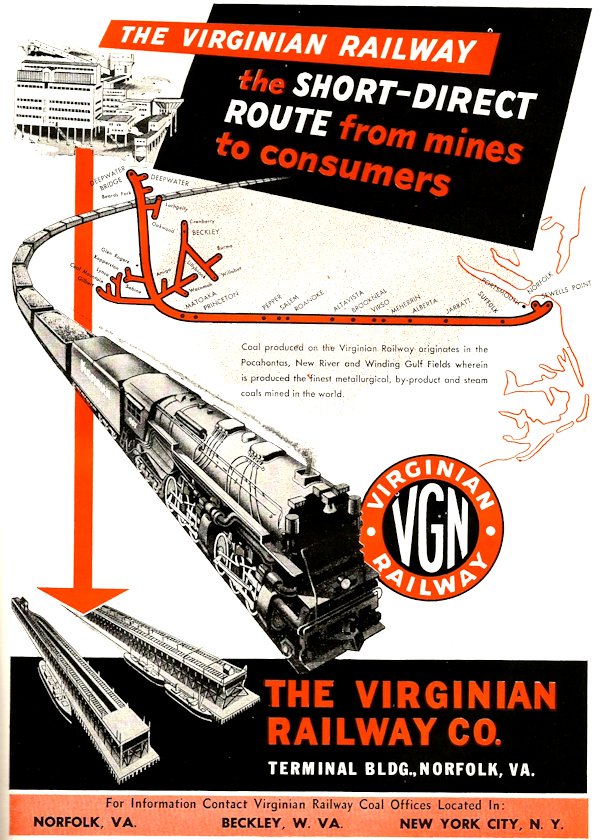WINDING GULF FIELD - MISC.
Sophia, WV is the commercial center for the eastern end of the Winding Gulf Coalfield.
Little is known about the coal camp named Sullivan except that the operator was Sullivan Coal & Coke Co. Their coal mining operation lasted
from 1909 until 1920.
An ancient fan, cut stone housing, and sheeted motor housing, located on Tommy Creek.
A mine mouth of unknown origin in Tommy Creek hollow.
This transfer structure for an overland conveyor on Tommy Creek is a remnant of Green Mountain Energy's Mine No. 1.
Company houses built by the Devils Fork Coal Co. in 1916 at Stephenson, WV. In fact, the community was originally known as
Devils Fork (although the actual Devils Fork Hollow is several miles away across the Raleigh County line). Buckeye Coal and Coke Company owned these houses and the coal mine after 1931.
Crozer-Page Coal Co., Stephenson, WV. Page Coal & Coke took over the Stephenson mines from Buckeye in 1957-58. Later Consol owned the coal mine, at first (from 1966 until 1975)
under their Pocahontas Fuel Co. subsidiary, and in 1976 and 1977 under the name Consolidation Coal Company. There was some small production in 1981, and that was the end of 65 years of coal mining at Stephenson.
This Virginian Railroad trestle at the northern edge of the field
calls to mind the might of the steel, coal, and railroad industries during the "robber baron" era.
The Mead Poca coal camp is now part of Mullens. It used to be a mining town opened around 1912 by the Mead Pocahontas Coal Company. The mine closed in 1927.
The Herndon preparation plant on Barker's Creek loads a train on a crisp Friday morning in March 2004. The plant was built by Eastern Associated Coal Co. in
the early 1960s. It was closed and demolished a few years after this picture was taken.
Not many people would believe that there was ever a deep mine in White Oak, WV, next to the Beckley Water Company reservoir. But these foundations are the
remants of just such a coal mine, not too far away from the Summers County line. This is at the edge of the Appalachian coal basin, and it was probably mined during the 1960s or '70s.
Not much left at Woodpeck, W.Va. these days. Wood Peck Coal Company opened the coal mine and coal camp in 1912.
One possible coal camp in the Winding Gulf field was the one constructed by the Blue Jay Lumber Company to house the workers of their No. 7 mine. This was located near the present day location of the intersection of Blue Jay Six Road and the WV Turnpike. The name of the road must have been a reference to Blue Jay Mine No. 6, near the No. 7 mine. The USGS Flat Top quadrangle of 1929 clearly shows
a community named "Blue Jay Mine No. 7" in that vicinity. The location of Blue Jay Mines Nos. 1 through 5 are unknown, but their tonnage has been recorded. The photo shown here is of the power house and motor barn at one of the Blue Jay Lumber Company coal mines, and appeared in the small magazine "The Log Train" in the 1980s. The article in the magazine showed other pictures from the Blue Jay mines, but did not identify at which mines the photographs were taken. Evidently information
about the Blue Jay mines is scarce because the article states, " The exact number of mines operated by the Blue Jay Lumber Company, and their precise location, however, remains a mystery...As with their locations, the dates the mines were opened are unknown...The outcroppings of the Blue Jay mines may have been discovered after logging operations had cleared the timber from the hillsides, but the exact detail of their discovery is also a mystery." Another unknown is whether or not the
Blue Jay mines were "captive" mines or if they shipped their coal to local and/or distant customers. The Blue Jay Lumber company would have have needed a great deal of coal for their own use. The company maintained a large saw mill at Blue Jay, WV, near present day Beaver, and also operated drying kilns and a lengthy railroad which ran out through Cool Ridge and down Flat Top Mountain to present day Camp Creek State Forest. The company would probably have needed coal
to power the locomotives which brought the logs out of the forests and to the sawmills. However, one photo in the "Log Train" magazine article clearly shows a C&O hopper car, which may indicate that some surplus coal from the Blue Jay mines was sold to other customers.
A new coal mine and preparation plant are constructed in the Winding Gulf Coalfield: International Coal Group's Bay Hill plant and coal mine (in the Pocahontas No. 3 seam). This could end up being the last
large scale coal mine to be developed in the Beckley, WV area, and thus the end of an era.
This drift portal at Blackeagle, W.Va. was the result of coal mining by Black Eagle Smokeless Coal Co., who opened the
mine in 1934. Later the Blackeagle was a captive mine of Jones & Laughlin Steel Corporation of Pittsburgh, Pa.
Slate dump at the Blackeagle site. J&L Steel closed the Blackeagle mines in 1956.
Tipple ruins, probably from the Madeline Mine in Devils Fork Hollow. Madeline Smokeless Coal Co. opened the Madeline Mine and
coal camp in 1926.

March 2010 image by author

November 2009 photo by author

January 2004 photo by author

January 2004 photo by author
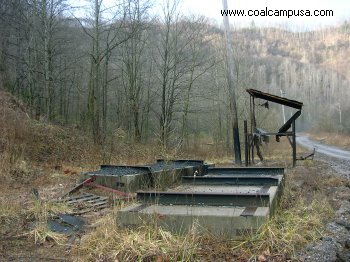
January 2004 photo by author
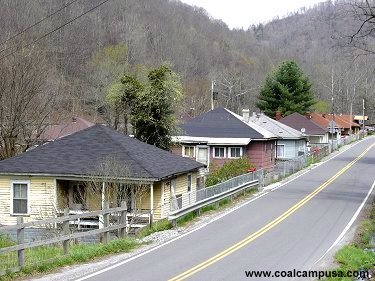
April 2007 photo by author

November 2002 photo by author
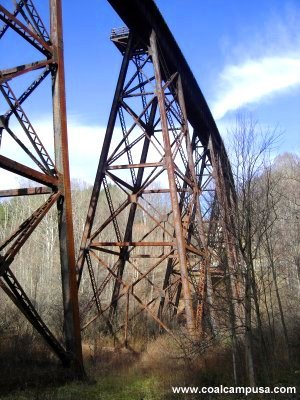
November 2006 photo by author
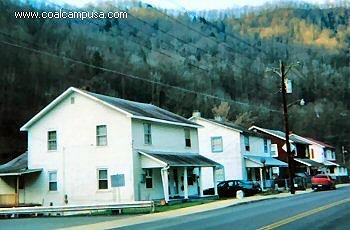
March 2004 photo by author
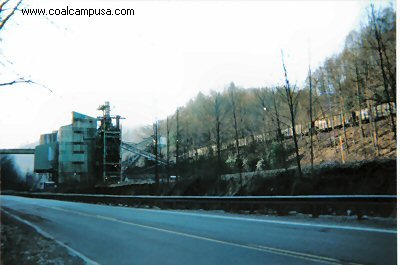
Mar. 2004 photo by author
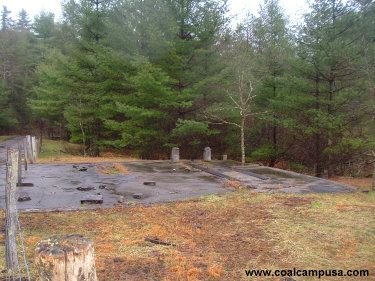
April 2005 photo
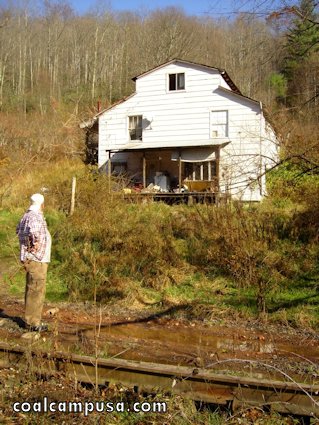
November 2009 image by author
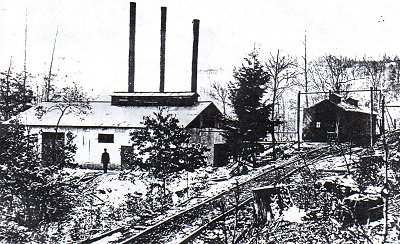
Photo courtesy of Chas. Dobbins
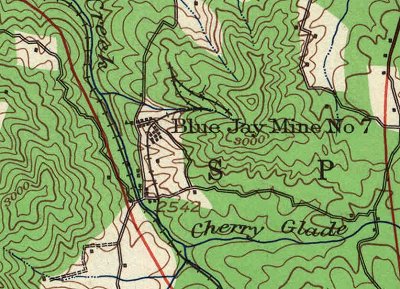
1929 USGS map showing the mysterious Blue Jay No. 7 coal camp, which is located along the lumber railroad that ran from Blue Jay to Camp Creek. The WV Turnpike, shown in red, has been added at a later date. The map also shows a school and a church at the town. None of the other Blue Jay Lumber Co. mines are are known to have had their own mining camp.
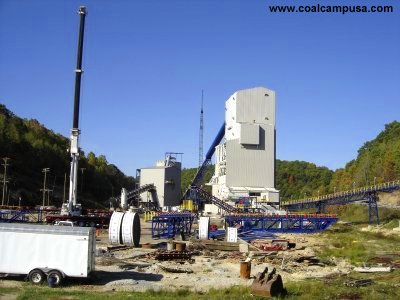
October 2007 image by author
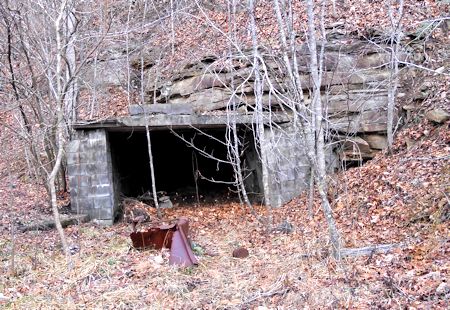
2011 WVDEP Abandoned Mine Lands Program image
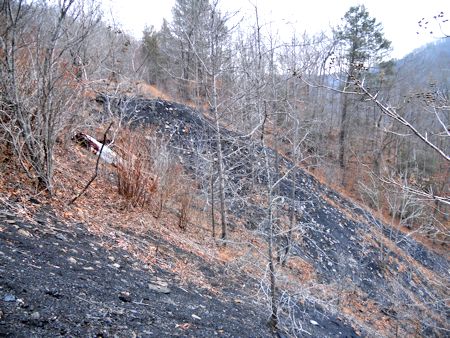
2011 WVDEP Abandoned Mine Lands Program image
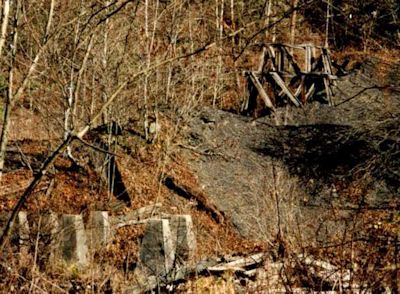
Apr. 1995 WV SHPO image by Melvin Hartley

